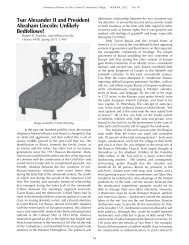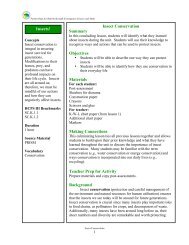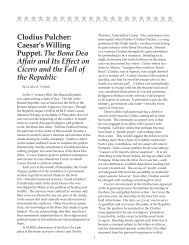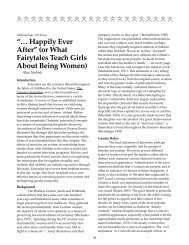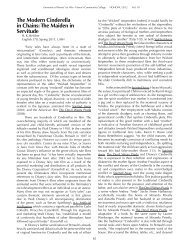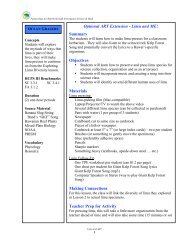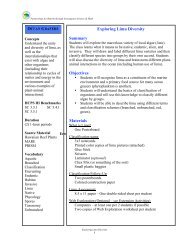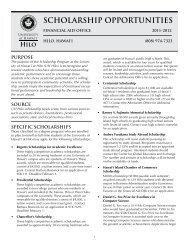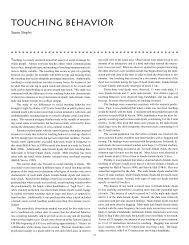A JOURNAL OF ACADEMIC WRITING VOLUME 8
A JOURNAL OF ACADEMIC WRITING VOLUME 8
A JOURNAL OF ACADEMIC WRITING VOLUME 8
Create successful ePaper yourself
Turn your PDF publications into a flip-book with our unique Google optimized e-Paper software.
Global Economy, Brian Berry explains there are four stages of<br />
economic development that all interact with each other. There<br />
are factor-driven, investment-driven, innovation-driven, and<br />
wealth-driven countries. Wealth-driven countries have reached<br />
a level of affluence that reduces the drive to succeed, which<br />
undermines innovation and investment, thus relying on other<br />
countries for those aspects (Berry). Innovation driven countries<br />
are reliant on factor-driven countries that provide them with<br />
resources and cheap labor. In the same way that wealth-driven<br />
and innovation-driven societies rely on the lesser, the lesser<br />
relies on them for opportunity and work. Some countries can<br />
be incorporated in more than one category, for example: the<br />
United States.<br />
Some believe that the United States reaps the most<br />
economic benefits of globalization. According to the United<br />
States Bureau of Economic Analysis, the United States’<br />
nominal GDP is $10,881,610.00, which is still more than<br />
twice the amount of the second world economic leader, Japan<br />
(U.S.). Comparatively, underdeveloped countries such as<br />
Ecuador accumulate only a fraction of the GDP of the U.S.<br />
at $54,583.79 billion. The U.S. has managed to surpass many<br />
nations and has enabled some Americans to become heavy<br />
consumers with a high standard of living. Some women in<br />
America walk around with purses that cost enough to feed a<br />
whole family living in Kenya for a year. Although this is not<br />
true of all Americans and this behavior does not only pertain<br />
to United States citizens, it represents the contrasts between<br />
economically developed countries and underdeveloped<br />
countries. Even with this knowledge of enormous economic<br />
differences, should the globalization revolution be perceived as<br />
bad aspect for the global community?<br />
Many societies are left out of the globalization process<br />
causing impoverished nations and low standards of living.<br />
Globalization requires underdeveloped countries to find some<br />
part of the economic production process to perform better and<br />
cheaper than their competitors, even at the expense of their own<br />
internal needs (Tynes). This is essential to compete in the global<br />
market. For example, the workers of the Maquiladora factories<br />
in Mexico earn below minimum wage, in unsafe conditions to<br />
provide basic necessities for their families. As discussed above,<br />
the underdeveloped or developing countries are represented<br />
in the investment-driven or factor-driven economies. In these<br />
stages, the countries are not only reduced to exploitation of<br />
outsourcing and raw materials, they are also regulated under the<br />
businesses of hegemonic, economically-ruling countries.<br />
Throughout history there has always been some sort<br />
of hegemonic power between people. In most cases, this<br />
hegemonic power is linked to economic dominance and the<br />
ability to modernize and urbanize (Rowntree). After America<br />
had begun to urbanize and exploit their own resources, it began<br />
8 - HOHONU Volume 8 2010<br />
exploring other parts of the world, and subsequently, colonizing<br />
these new lands for resources. The nation of Hawai‘i is a great<br />
example of the overthrowing of the existing rule for economic<br />
increase by the U.S. In the warm climate of Hawai‘i, sugar cane<br />
could be produced and exported throughout the world for a<br />
great profit. Because the U.S. had money, land and power, this<br />
was easy to do. “Overthrow” is not the ethical answer, but many<br />
countries are willing to jump on the global bandwagon.<br />
Another instance where underdeveloped countries feel<br />
the negative impacts of globalization is in Rwanda. Rwanda<br />
is a small, underdeveloped African country comprised of very<br />
little land. According to the World Bank statistics, Rwanda’s<br />
GDP is ranked in the lowest 150 countries in the world (The<br />
World Bank Group). Because they have little land with a large<br />
population, they are unable to grow the sufficient amount of<br />
food needed to sustain their population. This same situation<br />
worked out well for Sweden because it was able to export<br />
commodities to obtain the wealth to import food, but Rwanda<br />
has not been as privileged. Rwanda has very little resources to<br />
export and, as a result, they import food from other countries<br />
with the small amount of money they gain from exporting<br />
(Price). Therefore, they are stuck in an economic ditch, unable<br />
to advance their way of life.<br />
In many ways the environment is a limiting factor<br />
on economics. Basic resources such as petroleum, trees,<br />
and agricultural crops are extracted from the land and<br />
commoditized on the global market. Unfortunately, many of<br />
these resources are non-renewable and are being depleted at<br />
faster rates than they can be replenished. Globalization is at the<br />
heart of the over-exploitation or, more specifically, the depletion<br />
of these types of basic resources.<br />
The main link to the depletion of resources and<br />
globalization is over-consumption. Particularly, cultural<br />
standards facilitate over-consumption and also facilitate the<br />
need for surplus commodities to be exported. As the United<br />
States industrialized and globalized, it became part of the<br />
culture to purchase commodities. There are about 203.1<br />
million American adults in shopping centers monthly (Besio).<br />
This statistic does not pertain to grocery markets. It signifies<br />
the typical mall embodied by The Gap, Macy’s, Nordstrom,<br />
and other high-end stores selling vast amounts of unnecessary,<br />
though some do not agree, items. All of these items require a<br />
significant quantity of resources, including cotton to create the<br />
clothes, and oil that is required for international transportation.<br />
Oil is intricately linked with globalization through timespace<br />
compression. The time-space compression refers to<br />
technologies, such as transportation, that decrease spatial and<br />
temporal distances and increase the flow of communications<br />
and ideas. Unfortunately, oil consumption for transportation<br />
is one of the biggest problems that the world faces today.



